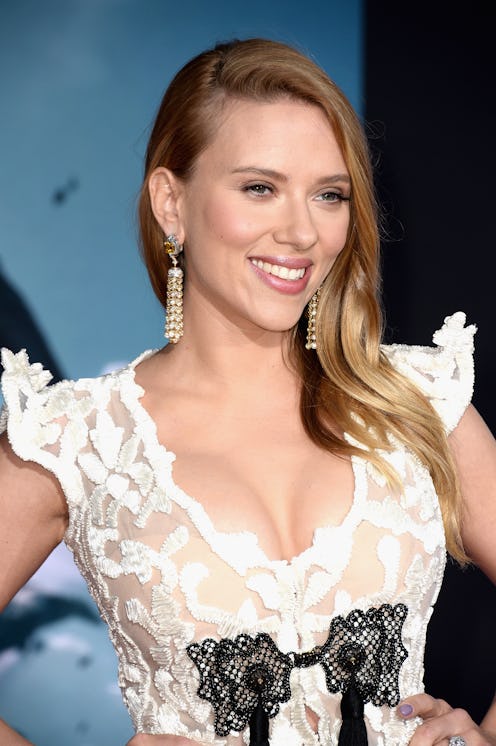Entertainment
She Called Dylan Farrow's Letter 'Irresponsible'
When Dylan Farrow wrote her now-famous letter in the New York Times in February, her allegedly abusive estranged father wasn't the only person she accused of wrongdoing. Toward the end of the essay, Farrow called out several of Allen's former and present muses, including Cate Blanchett, Emma Stone, and Alec Baldwin, for continuing to work with the director despite the uncertainty over his past actions. While Blanchett and Baldwin have both spoken up about the allegations —hesitantly, in Blanchett's case, and angrily, in Baldwin's — none of the other actors mentioned in the letter, or any other celebrity who has worked regularly alongside Allen, has said a word. Now, however, Scarlett Johansson, a frequent Allen muse and one of the actors singled out in Farrow's letter, has finally opened up — but unfortunately for Johansson, she might've been better off not saying anything at all.
In an interview with The Guardian, Johansson, asked about her reaction to being named in Farrow's letter, seemed to consider herself a victim of the ordeal.
"I think it's irresponsible to take a bunch of actors that will have a Google alert on and to suddenly throw their name into a situation that none of us could possibly knowingly comment on," Johansson said. "That just feels irresponsible to me."
Being called out so publicly without warning may not be "fair," but the way Johansson phrased her response, it's as if she doesn't understand that Farrow mentioned famous actors in her essay for a reason. She wasn't just singling them out to make their lives harder, but rather, to implore them, as well as anyone else whose career has benefited from Allen's films, to reevaluate their relationships with the director. Yet according to Johansson, this call to action was "irresponsible."
The actress's comments didn't stop there, however. When asked about the backlash against Allen following Farrow's letter, Johansson played naive.
"I'm unaware that there's been a backlash," she said. "I think he'll continue to know what he knows about the situation, and I'm sure the other people involved have their own experience with it. It's not like this is somebody that's been prosecuted and found guilty of something, and you can then go, 'I don't support this lifestyle or whatever.' I mean, it's all guesswork."
Even if it was at all believable that Johansson was unaware of the backlash — doesn't that Google alert tell her anything? — her response is still immensely problematic. The actress seems to feel that unless a person is convicted of their crimes, there's no reason to doubt their innocence, or even form one's own opinion on the allegations at hand. Allen will never stand trial for Farrow's claims, and even if, by some chance, the director was found legally guilty of sexual abuse, Johansson seems to believe it wouldn't call for anything more than a lack of support "or whatever" from his coworkers and fans. She doesn't seem to realize, or at least be ready to admit, the seriousness of Allen potentially having molested Farrow, let alone the hypothetical situation of the claims being proved correct by a court of law.
It's understandable that Johansson, like the other actors mentioned in Farrow's letter, would feel uncomfortable about being pulled into the family's issues. The actress wasn't a part of Allen's life when Farrow claims the abuse occurred, and, unlike Blanchett or Louis C.K., for instance, she hasn't made a film with the director since 2008. Still, the fact that Allen did have a substantial part in boosting Johansson's career (she starred in three of his movies) is motive for Farrow to call her out, and it makes Johansson just as liable for her behavior as Blanchett or any of the others. Like them, she doesn't have a responsibility to speak out about Allen, but, like them, if she chooses to do so, then it's imperative that she pick her words carefully.
As Farrow said in her letter, the message that Hollywood sends matters, especially in regards to such issues as abuse. A person in a position of power, like Johansson, not addressing these matters with the seriousness they warrant is not only disappointing, but dangerous. And for Johansson, calling out an alleged abuse victim for making her own life slightly more difficult, even if it's true, only makes her seem naive, self-pitying, and callous.
Johansson did manage to end her statements on Allen with more grace then she previously showed, saying that she doesn't "know anything about it," and that "it would be ridiculous for me to make any kind of assumption one way or the other." In this regard, she's correct; although there's more than enough reason for one to suspect Allen of guilt, no one except Allen and Farrow truly knows what occurred. Yet because Johansson prefaced this statement with such willful ignorance, the only reasonable part of her entire Allen response is taken without much merit.
No one forced Johansson to speak out, but she chose to do so, in a way that's damaging to Farrow, to abuse victims (alleged or not), and to herself; while, like Blanchett's decision to thank Allen in her Oscar speech, Johansson's interview won't ruin her career, it will certainly alter many in the public's view of her character. The actress may have had good intentions in speaking out, but next time she chooses to call an alleged abuse victim "irresponsible" or make herself look like a victim, she should think twice.
